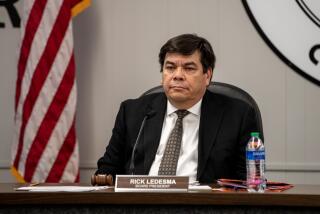At Mom’s Request, School Agrees Not to Revive Girl if Heart Stops
- Share via
LEWISTON, Me. — The local school board listened to a parade of critics but voted again Tuesday to honor a mother’s request that her severely disabled 12-year-old daughter not be resuscitated if her heart stops.
Some teachers say the idea goes against their instincts and that other children could be traumatized if a youngster was allowed to die in front of them. Advocates for the disabled say society should not decide if a child lives or dies.
At the school board hearing Monday night, which lasted into the early morning hours Tuesday, the mother, Linda Lafrance, said she believes in miracles, but “I also believe in reality.”
Lafrance’s daughter, Corey Brown, is retarded and suffers from spastic cerebral palsy and scoliosis, or curvature of the spine.
Doctors say her condition is deteriorating, making it increasingly difficult for her to breathe, and that the blows and chest compressions of cardiopulmonary resuscitation might only cause her pain and injury.
The school board earlier this year voted 6-2 to ignore the instructions from Dr. Richard Marsh, Corey’s pediatrician. Then, in apparently the first vote of its kind in the nation, the board reversed itself last month on a 6-3 vote. Board members said they were swayed by Marsh’s explanation.
That decision was reaffirmed Tuesday in a 7-2 vote. The board said the district would consider future requests for do-not-resuscitate orders on a case-by-case basis.
School board member John A. Aliberti said he had no intention of changing his vote, because he was convinced by testimony from Lafrance and Corey’s doctor.
“I would want to give Corey all the comfort and affection she deserved,” he said. “But I would not try to resuscitate her.”
Such do-not-resuscitate orders do not bar medical treatment, but rather require that unusual measures not be taken to revive patients. They are common in hospitals in cases involving elderly and severely ill patients.
At Farwell School, where Lewiston sends young children with multiple disabilities, Corey is in a class with eight other children.
The Farwell School has 380 students, 20 in special education classes.
More to Read
Sign up for Essential California
The most important California stories and recommendations in your inbox every morning.
You may occasionally receive promotional content from the Los Angeles Times.













